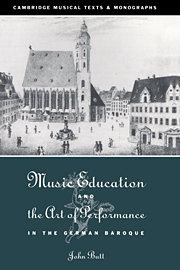Book contents
- Frontmatter
- Contents
- List of plates
- Preface
- Acknowledgements
- List of abbreviations
- 1 The establishment of Lutheran musical practice in the sixteenth century
- 2 The role of practical music in education c. 1600-1750
- 3 The contents, layout and style of instruction books
- 4 The development of performance practice and the tools of expression and interpretation in the German Baroque
- 5 Ornamentation and the relation between performer and composer
- 6 The decline of the Lutheran cantorates during the eighteenth century
- Notes
- Bibliography
- Index
Preface
Published online by Cambridge University Press: 03 December 2009
- Frontmatter
- Contents
- List of plates
- Preface
- Acknowledgements
- List of abbreviations
- 1 The establishment of Lutheran musical practice in the sixteenth century
- 2 The role of practical music in education c. 1600-1750
- 3 The contents, layout and style of instruction books
- 4 The development of performance practice and the tools of expression and interpretation in the German Baroque
- 5 Ornamentation and the relation between performer and composer
- 6 The decline of the Lutheran cantorates during the eighteenth century
- Notes
- Bibliography
- Index
Summary
Modern studies of ‘original’ performance practices are often presented in a historical vacuum: we learn of conventions applicable to particular repertories without necessarily knowing why these conventions pertained, without imagining the original performers' thoughts and beliefs concerning performance and unaware of the extent to which the interpretative conventions matched these beliefs. The inquiry is genuinely historical only if we can learn something of the motives for the composition and performance in the first place, how the combined forces of composer and performer were assumed to affect the original listeners.
Many histories of music centre on the surviving works of a particular age, their interrelationships and influences. Some recent studies are more concerned with the social, cultural and political environments in which music was cultivated. Seldom though is a history created out of performance as a system of thought. What did it actually mean to perform, as opposed to compose? To what extent did performance presuppose the other disciplines of music, its supposed natural laws and rationale?
This study attempts to give something of the background and rationale for performance in a specific educational institution – the Lutheran school and church – over a specific period. This field is particularly fruitful, not least because of the remarkable achievements of German Baroque composers who grew on its soil, but also because practical music held such a significant place alongside the standard education of the Lutheran ‘Latin’ schools.
- Type
- Chapter
- Information
- Publisher: Cambridge University PressPrint publication year: 1994

